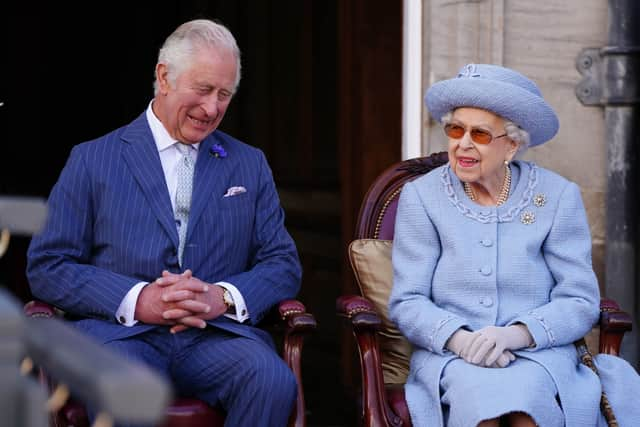What jobs did the Queen do? A monarch’s royal duties and roles which now pass to King Charles III explained
and live on Freeview channel 276
The Queen, who had been a figurehead for the UK and the Commonwealth since she first ascended to the throne in 1952, has died after a 70 year reign.
During her reign, which was the longest of any British monarch, she had many wide-ranging and important roles.
Advertisement
Hide AdAdvertisement
Hide AdHer Majesty was always supported in her work by members of the royal family, including her eldest son Charles, who is now King, and grandson Prince William, who is now heir to the throne.
The late Queen was a constitutional monarch, which meant that her powers ere symbolic and ceremonial, and she was politically neutral.
It also means that while Queen Elizabeth II was the Sovereign Head of State, it was only elected Parliament that could - and still can - make and pass legislation, rather than the monarch.
So, what exactly did Her Majesty do, and what tasks will be passed to King Charles III?
Here’s what you need to know.


What was the Queen’s job?
Advertisement
Hide AdAdvertisement
Hide AdThe Queen had a very important part to play in the life of the nation.
She undertook constitutional and representational duties and carried out a busy programme of engagements throughout the year.
She was the Head of State, Head of Nation, Head of Commonwealth, Head of the Church of England, Head of the Armed Forces and Patron of Charities.
Her calendar included events such as visiting charities, hosting visiting Heads of State and meeting foreign ambassadors and high commissioners based in the UK.
Advertisement
Hide AdAdvertisement
Hide AdThe number of official events she carried out, however, became less in the last year of her life as her health issues became apparent.
The Queen was royal patron or president of more than 600 charities, military associations, professional bodies and public service organisations.
Her Majesty also took part in annual programmes of investitures, garden parties, receptions and other ceremonies, for example she normally lead the annual Remembrance event at the Cenotaph in London in November.
As Head of Nation, she attended special events and gave national messages such as the annual Christmas broadcast.
What did the Queen do every day?
The Queen had numerous daily duties.
Advertisement
Hide AdAdvertisement
Hide AdAlthough she could not pass legislation, her input into government matters was still valuable.
Her Majesty received daily dispatches from the government in a red leather box, such as briefings ahead of important meetings or documents, which all needed her formal signature.
When a piece of legislation is passed through Parliament, it must be formally approved by the monarch in order to become law.
The last time royal assent was refused, however, was in 1708. This was for the Scottish Militia Bill. The then Queen, Queen Anne, withheld royal assent on the advice of her ministers for fear that the proposed militia would be disloyal.
What did the Queen do every week?
Advertisement
Hide AdAdvertisement
Hide AdEach week, the Queen met the Prime Minister as all Prome Minsisters are required to keep the monarch informed on all government matters.
These meetings had been taking place every Wednesday at Buckingham Palace.
There were 15 UK Prime Ministers during Queen Elizabeth’s reign, including Winston Churchill, Margaret Thatcher, Boris Johnson and the current Prime Minister Liz Truss, who Her Majesty welcomed to form a new government just two days before her death.
This meeting is completely private. No special advisers attend and there is no official record of what is said.
What did the Queen do every month?
Advertisement
Hide AdAdvertisement
Hide AdThe Queen usually held important meetings called the Privy Council every month.
The Privy Council, which had been officially called Her Majesty’s Most Honourable Privy Council but is now expected to be renamed as His Majesty’s Most Honourable Privy Council, is a formal body of advisers for the monarch.
Its membership is mainly made up of senior politicians who are current or former members of either the House of Commons or the House of Lords.
The Council is the mechanism through which interdepartmental agreement is reached on those items of Government business which, for historical or other reasons, fall to Ministers as Privy Counsellors rather than as Departmental Ministers.
Advertisement
Hide AdAdvertisement
Hide AdThe late Queen had cancelled a virtual meeting with the Privy Council just one day before her death, with doctors saying she was too unwell to attend.
What other important duties did the Queen have?
The Queen also performed a number of Parliamentary functions:
- Appointing and dissolving a government: The leader of the party which wins a general election is invited to Buckingham Palace. There, they are formally invited to form a new government. The Queen also formally dissolved a government before a general election.
- State opening and the Queen’s Speech: The Queen began the Parliamentary year with the State Opening ceremony. She delivered a speech from the throne in the House of Lords in which she set out the government’s policy plans. King Charles III, who was then Prince Charles, delivered the 2022 Queen’s Speech on her behalf.
Will King Charles III take over all of the King’s duties?
Details are still emerging about exactly what will happen now the Queen has died, and what kind of king Charles III will be, but it is expected that the new monarch will take over all the duties previously carried out by his late mother.
It is also expected that the new King will be supported in carrying out these various roles by his eldest son, Prince William, and - in time - his eldest son, Prince George, who is now third in line to the throne.
Comment Guidelines
National World encourages reader discussion on our stories. User feedback, insights and back-and-forth exchanges add a rich layer of context to reporting. Please review our Community Guidelines before commenting.
